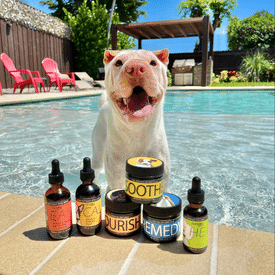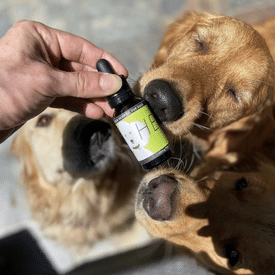Natural Alternative to Benadryl for Dog Allergies

Using Benadryl for dog allergies is often some pet parent’s go-to when looking for a quick way to soothe allergy symptoms. However, although using Benadryl for dog allergies is fast-acting, it doesn’t treat the root of the problem, and it could come with some heavy baggage. That’s why more pet parents are now searching for a natural alternative to Benadryl for dog allergies. Here at CBD Dog Health, we believe the best course of action is determining the root cause of the allergen and using natural supplements to boost the body’s natural defenses. Inflammation is at the root of much of our pets itchiness. One thing that CBD and Benadryl have in common, is that they both target and reduce inflammation.
For most people, CBD is a new thing or can be intimidating (which is why we made this CBD guide for pet parents), making pet parents more likely to run to the store and grab a bottle of Benadryl when the scratching starts. Honestly, who would have thought CBD could help allergies and itchiness? But, it does, and we’re happy to share how!
Table of Contents
What Is Benadryl?
Benadryl, a brand name of the drug Diphenhydramine, is an over-the-counter antihistamine. It’s most often used to treat mild allergy symptoms in humans, though pet parents are often advised to use it for their dog as well.
Benadryl is often used to help relieve symptoms of hay fever, seasonal and other allergies, symptoms of the common cold, as well as itchy skin due to bug bites, hives, and other causes. Due to the sedative effects of Benadryl, it can also be used for motion sickness in dogs, and some pet parents also choose to use it as a way to reduce anxiety in dogs. Veterinarians have also been known to prescribe Benadryl for Mast Cell Tumors as well.
How Does Benadryl For Dog Allergies Work?
Allergies are an immune response to an otherwise harmless substance, perhaps food or something environmental. The immune system responds to the triggering allergen by releasing histamine. When histamine binds to cell receptors, it stimulates changes in the cells that lead to the release of chemicals that cause sneezing, itching, and increased mucus production. Histamine causes all those symptoms we associate with allergies, in an effort to get those allergens out of the body.
Antihistamines, like Benadryl, block histamine activity, seeking to stop that allergic reaction. Benadryl’s active ingredient, Diphenhydramine, is a receptor antagonist, which just means it works by blocking the receptors that receive histamines. With antihistamines, like Benadryl, the body will still produce histamines, but the cell receptors are blocked from recognizing them, which stops those allergy symptoms.
So what does this mean for your pet’s allergies? It means Benadryl is indeed a quick way to relieve allergy symptoms, however it is not addressing your pet’s immune system response or the allergens triggering the response. It is simply addressing the symptoms, and not the cause.
Is Benadryl Safe For Dogs?
Benadryl is not yet FDA-approved for veterinary use, however it is still commonly used in veterinary practices across the U.S.
Benadryl can cause mild or serious side effects.
Common Side Effects of Benadryl in Dogs:
- Excessive drowsiness
- Dry mouth
- Hypersalivation
- Urinary retention
- Rapid breathing
- Increased heart rate
- Rarer side effects include diarrhea, vomiting, and change in appetite.

Can My Dog Overdose On Benadryl?
Dogs, and humans, have been known to overdose on Benadryl. An overdose can be fatal.
If your pet is experiencing an overdose, you’ll likely see the Central Nervous System become overloaded, resulting in:
- Dilated pupils
- Rapid heartbeat
- Agitation
- Constipation
- Seizures
- Fatality
The moment you think your dog could be overdosing, it’s critical to call your emergency veterinary hospital immediately.
Although online challenges may encourage it, it is not safe to take more than the recommended dosage of Benadryl. Doing so can lead to overdose and severe symptoms, including abnormal heart rhythms, hallucinations, seizures, and even death in rare cases.
CBD: A Natural Alternative to Benadryl for Dog Allergies
So how can CBD for dog allergies help? CBD and the other compounds found in a full-spectrum hemp extract work to bring the body’s systems into homeostasis. That’s just a fancy way of describing a state of balance.
There are tons of cannabinoid receptors throughout the organs that control our pet’s immune systems. Instead of turning off the immune responses, as Diphenhydramine does, CBD instead increases communication between cells in the immune system. This means CBD for dog allergies can encourage a more moderate and targeted response to allergy symptoms.
Additionally, compounds found in cannabis that reduce inflammation are abundant and diverse. The most abundant phytocannabinoids in cannabis, THC and CBD, both have strong anti-inflammatory properties, while CBC, CBG, and THCV have also demonstrated anti-inflammatory properties.
Inflammation has long been a well-known symptom of most infectious diseases. However, research now suggests that chronic inflammation is not just a symptom, it actually causes and advances many common diseases. Allergies, anxiety, chronic pain, and autoimmune disease, are all examples of conditions associated with inflammation. When we soothe that inflammation, we are addressing the cause of the problem and therefore the hurt.
At CBD Dog Health, we designed the EASE: CBD Oil for Dogs to specifically target allergies in pets. A great natural alternative to Benadryl for dog allergies, EASE also contains frankincense and turmeric, whose anti-inflammatory and immune supportive properties work synergistically with CBD.
A recent Comparative Study of Classical and Alternative Therapy in Dogs with Allergies showed that turmeric significantly alleviates the symptoms of food allergies and inhibits the levels of IgE and IgG1, which significantly reduce the symptoms of food allergies in dogs. That’s one of the reasons we included Turmeric in our EASE formula!
Additionally, the skin is often the first place allergy symptoms appear, so our SOOTHE salve is formulated to provide localized relief. For a truly holistic approach, we recommend addressing chronic conditions from all possible angles. That’s why dogs suffering from allergies do so well when combining the effects of EASE and SOOTHE for both localised and systemic allergy relief for dogs. We’ve bundled EASE and SOOTHE together for bigger savings in our Allergy Duo.
Giving full disclosure, holistic pet care and natural plant medicine may not produce the instant gratification that Benadryl produces. This is because CBD oil communicates with the body in an effort to target the root cause, and encourage homeostasis in the body. Holistic medicine seeks to address each animal as an individual with respect to the complexity of their specific needs.
Is CBD Safe For Dogs?
Full-Spectrum hemp extract is extremely safe for both short and long term use. Numerous studies have proven the safety of cannabis based medicine at even extreme high doses. Doses of up to 640.5 mg of CBD rich extract were well tolerated by dogs, with only mild adverse effects.
The potential side-effects that can occur with a full spectrum hemp extract are mild and usually temporary. In most cases, the worst side effects are mild diarrhea or lethargy upon starting CBD. There are also plenty of great herbal remedies to support these symptoms, and as the body gets used to a new dietary supplement, these occurrences fade away.
Dosing CBD for Dog Allergies
Despite common misconceptions, dosing CBD has very little to do with your dog’s size and weight. Sensitivity can range greatly between dogs, and can even change over time, based on age or chronic illness. Dosage is most effectively determined with consideration for each animal’s unique physiological condition.
In the case of CBD for dog allergies, we recommend a dosage ranging from 9-18 mg a day. Best way to administer is applied directly to the gums, in two to three separate applications throughout the day for consistent use.
Our EASE tincture is specially formulated so that one full dropper (1mL) is one standard dose of 9mg of CBD for dog allergies. For localized relief of these acute allergy symptoms, there is nothing better than a topical CBD product, like our SOOTHE salve. Our salves can be applied 2-3 times a day, as needed.
Pet parents are often highly concerned that they will give too much CBD and cause harm to their pets. More often than not when a pet is not having the desired reaction, it is because the pet isn’t getting the dosage they need for their ailment. If you feel nervous about experimenting to find the upper limit of their sensitivity, rest assured, it is completely safe.
Related: CBD Dosage for Dogs
Final Thoughts on Dog Allergies
We know how difficult it is to watch your pet constantly itching and scratching, or suffering from worse allergy symptoms. Unfortunately, without finding the root cause, your pet isn’t going to actually get better and the relief will be temporary.
Make sure to look into the possible triggers of your dog’s allergies. Consider sensitivities to particular foods in their diet, chemicals in their environment and look for ways to encourage the proper functioning of the body’s natural immune responses. There is so much that goes into the proper functioning of our pet’s body and their immune system. 70% of the immune system is housed in the gut. For this reason, good gut health is fundamental to overall wellness. Remember to be your pet’s biggest advocate, we want to help our pets live their best life, instead of just finding quick solutions to cover up symptoms.















